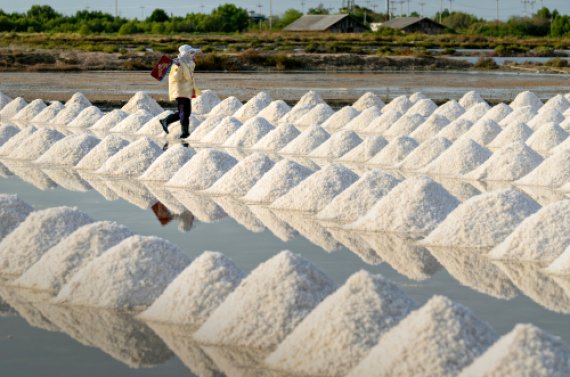Uncovering the Versatility of Sea Salt===
When we think of sea salt, the first thought that comes to mind is its use as a seasoning in our favorite dishes. However, sea salt is much more than just a flavorful addition to our meals. This versatile wonder has been used for centuries, not just in cooking, but also in preserving food, promoting wellness, and even in household and personal care. Its unique composition and numerous benefits make it an essential ingredient in many aspects of our lives. Let us explore the various uses and benefits of sea salt in more detail.
===A Brief History of Sea Salt: From Ancient Times to Modern Day===
Sea salt has been used for thousands of years, dating back to ancient times. It is believed that the ancient Egyptians and Greeks used sea salt for preserving food and as a form of currency. The Roman Empire also heavily relied on sea salt for preserving food and trading. In the Middle Ages, sea salt was a valuable commodity, used not only for food preservation but also for medicinal purposes. Today, sea salt is still a popular ingredient, and its production has evolved to meet modern demands.
===The Unique Composition of Sea Salt: What Sets It Apart from Table Salt===
One of the key differences between sea salt and table salt is their composition. Sea salt is primarily composed of sodium chloride, but it also contains traces of other minerals such as magnesium, calcium, and potassium. These minerals give sea salt its distinct flavor and color, making it a more flavorful and nutritious option compared to table salt. In addition, sea salt is harvested directly from the ocean, while table salt is heavily processed, which can strip it of its natural minerals.
===Cooking with Sea Salt: Enhancing Flavors and Adding Depth===
Sea salt is a staple in the kitchen, used as a seasoning in various dishes. Its unique composition and flavor add depth and enhance the taste of food. Sea salt can be used in both savory and sweet dishes, from sprinkling it over roasted vegetables to using it in desserts like salted caramel. Its coarse texture also adds a nice crunch to dishes, making it a popular choice among chefs and home cooks alike.
===Preserving Food with Sea Salt: A Traditional Method with Modern Applications===
Before refrigeration, sea salt was the primary method for preserving food. Its high sodium content draws out moisture, inhibiting the growth of bacteria and preventing spoilage. Today, sea salt is still widely used in food preservation, with modern applications such as curing meats and making pickles. Its natural properties make it a healthier option compared to artificial preservatives.
===Healing Properties of Sea Salt: Relieving Ailments and Promoting Wellness===
Sea salt is not just beneficial in the kitchen; it also has healing properties that have been recognized for centuries. Bathing in sea salt water has been practiced as a form of therapy for various ailments, such as muscle aches, skin irritations, and respiratory issues. In addition, sea salt is also known to have detoxifying properties, promoting overall wellness and relaxation.
===Exfoliating and Nourishing Skin with Sea Salt: The Natural Beauty Routine===
Sea salt is a popular ingredient in many beauty and skincare products. Its coarse texture makes it an excellent exfoliator, removing dead skin cells and revealing smoother, healthier-looking skin. The minerals in sea salt also have hydrating properties, making it a great option for nourishing and moisturizing the skin. Some also believe that sea salt can help with conditions like acne and eczema.
===Sea Salt in Home Cleaners: Eco-Friendly and Effective Solutions===
We are becoming increasingly aware of the harmful chemicals in traditional cleaning products, making eco-friendly alternatives more popular. Sea salt can be used as a natural and effective cleaner in our homes. Its abrasive texture makes it effective at removing tough stains and grime, while its antibacterial properties help disinfect surfaces.
===Gardening with Sea Salt: Boosting Plant Growth and Deterring Pests===
Sea salt can also be beneficial in gardening, with its mineral content helping to boost plant growth. A small amount of sea salt can be added to the soil to provide plants with essential nutrients. It can also be used as a natural pest deterrent, helping to keep unwanted insects away from your plants.
===The Role of Sea Salt in Bathing Rituals: Relaxation and Detoxification===
In addition to its healing properties, sea salt is also an essential ingredient in many bathing rituals. Adding a cup of sea salt to a warm bath can help relax muscles, improve circulation, and detoxify the body. Some also believe that sea salt baths can help improve skin conditions like psoriasis and eczema.
===Beyond the Kitchen: Creative Uses for Sea Salt in Household and Personal Care===
Sea salt’s versatility extends beyond the kitchen and bathroom. It can also be used in various household and personal care tasks. For example, sea salt can be used to clean and deodorize cutting boards, freshen up carpets, and even create a natural deodorant. Its uses are endless, making it a must-have in any household.
===Sourcing and Storing Sea Salt: Tips for Optimal Quality and Shelf Life===
When it comes to sourcing and storing sea salt, there are a few things to keep in mind. It is essential to look for high-quality, unrefined sea salt that is free from additives and preservatives. Sea salt can also clump when exposed to moisture, so it is best to store it in an airtight container in a cool, dry place.
===
Sea salt’s versatility and numerous benefits make it a staple in many aspects of our lives. From cooking and preserving food to promoting wellness and beauty, there is no denying the power of this natural wonder. So next time you reach for your sea salt shaker, remember all the other ways you can incorporate it into your daily routine.

